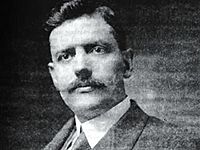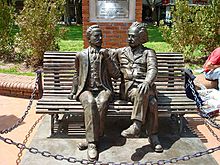Carlos Vaz Ferreira facts for kids
Quick facts for kids
Carlos Vaz Ferreira
|
|
|---|---|

Carlos Vaz Ferreira
|
|
| Born | Carlos Vaz Ferreira October 15, 1872 |
| Died | January 3, 1958 (aged 85) |
| Occupation | Writer, philosopher |
| Nationality | Uruguayan |
Carlos Vaz Ferreira (born October 15, 1872 – died January 3, 1958) was an important Uruguayan philosopher, lawyer, and writer. He was also a respected teacher and academic. He helped bring new ideas to South America, like liberalism (which means valuing freedom and individual rights) and pluralism (which means accepting many different ideas). He also introduced pragmatism, a way of thinking that focuses on practical results.
Contents
Life and Education
Carlos Vaz Ferreira was born in Montevideo, the capital city of Uruguay. His younger sister, María Eugenia Vaz Ferreira, became a famous poet.
Early Career and Writings
Carlos Vaz Ferreira started his writing career in 1897. His first published work was called "Lecture Course on Elemental Psychology." In the same year, he began teaching philosophy at the University of the Republic. He also published a book about formal logic in 1898.
In 1903, he became a licensed attorney, meaning he could practice law.
Important Works and University Roles
Between 1905 and 1910, Vaz Ferreira wrote some of his most important books. These included "Ideas and Observations" (1905), "Problems of Liberty" (1907), and "Knowledge and Action" (1908). He also wrote "Morals for Intellectuals" (1908), "Pragmatism" (1909), and "Living Logic" (1910).
In 1913, he became an associate professor at the University of the Republic. He continued to publish many works, including "Readings on Pedagogy" (1918) and "On Social Problems" (1922). In 1933, he wrote "On Feminism," which was one of the first academic discussions about feminism in Latin America.
Leadership at the University
Vaz Ferreira served as the vice-chancellor (a high-ranking leader) of the University of the Republic twice. First from 1928 to 1931, and again from 1935 to 1941. During his second term, he bravely defended the university's freedom to teach and research without government interference. This was important because Uruguay was under a dictatorship at the time.
In 1945, one of his long-term goals came true: the university created the Faculty of Humanities and Education Sciences. He became its dean (the head of the faculty) and stayed in that role until he passed away in 1958.
Carlos Vaz Ferreira's Philosophy
Vaz Ferreira's ideas were shaped by many thinkers. He was especially influenced by Herbert Spencer and John Stuart Mill. Later, he also learned from the ideas of William James and Henri Bergson.
Understanding Reality
Vaz Ferreira believed that reality is huge and complex, much bigger than what we can fully grasp. He thought that our minds use logic and language to simplify reality. This helps us understand and talk about things, but it also means we don't always see the full picture.
He felt that "systems" – like strict rules or theories – are not enough to truly understand the world. While creating systems is natural for humans, they can sometimes lead to dogma (beliefs that are held without question) that don't match reality.
Vaz Ferreira used the idea of language itself as a system. When we use words, we put things into categories. This simplifies reality, but it also separates us from its true complexity. He believed it was important to know the difference between reality and how we talk about it.
Science and Philosophy
For Vaz Ferreira, science is a tool that helps us interact with the world. It gives us useful knowledge, but it also has limits. Philosophy, on the other hand, is a broader way of knowing. It recognizes the limits of scientific thinking and tries to bring all human knowledge together.
He used the metaphor of the sea to explain this: the deeper you go, the less clear it becomes. This means that while science gives us clear, specific knowledge, philosophy explores deeper, more complex questions, even if they are less precise. He saw science and philosophy as working together, like siblings, to understand the world.
Vaz Ferreira also thought there were "good" and "bad" ways of thinking about ideas like positivism (focusing only on what can be scientifically proven), skepticism (doubting things), and pragmatism (focusing on practical results).
- Good positivism encourages a love for science.
- Good skepticism makes us question things in a healthy way.
- Good pragmatism helps us make decisions by admitting what we don't know.
Living Logic: Thinking Clearly
One of Vaz Ferreira's most important ideas was "Living Logic" (or "Psycho-Logic"). This idea explores how our language and ways of thinking can sometimes create problems that don't actually exist in reality.
Living Logic helps us see common mistakes in thinking. It encourages a more complete way of understanding, based on real-life situations rather than just strict rules. This way of thinking also includes an "Ethic of Understanding," which means being honest and open in how we think and learn.
Morality and Religion
Vaz Ferreira believed that morality (our sense of right and wrong) should be flexible. Instead of following strict, unchanging rules, he thought morality should consider the unique problems of each person and situation. He valued experience and suggested that our ideas about what's possible should be vast and open.
He also felt that strict ideals can sometimes cause problems, leading to unnecessary sacrifices or conflicts. He hoped for a world where people could find solutions without constant struggle.
Carlos Vaz Ferreira was an agnostic, meaning he believed we cannot know for sure if God exists. He was a free-thinker, like many educated Uruguayans of his time. While he sometimes criticized religious organizations, he respected personal religious feelings. He saw religion as a way to explore big questions and doubts about the unknown with sincerity and an open mind.
Major Works
Books
- Curso expositivo de Psicología elemental (1897)
- Ideas y Observaciones (1905)
- Los problemas de la libertad (1907)
- Conocimiento y acción (1908)
- Moral para los intelectuales (1908)
- El Pragmatismo (1909)
- Lógica viva (1910)
- Lecciones de pedagogía y cuestiones de enseñanza (1918)
- Sobre la propiedad de la tierra (1918)
- Sobre los problemas sociales (1922)
- Sobre feminismo (1933)
- Fermentario (1938)
- La actual crisis del mundo (1940)
Essays
- Ideas sobre la estética evolucionista (1896)
- Psicología (1897)
- Sobre la percepción métrica (1920)
- Estudios pedagógicos (1921)
- Trascendentalizaciones matemáticas ilegítimas y falacias correlacionadas (1963)
- Sobre enseñanza de la filosofía (1963)
- Enseñanza de las ciencias experimentales (1963)
- Tres filósofos de la vida (1965)
See also
In Spanish: Carlos Vaz Ferreira para niños
 | Frances Mary Albrier |
 | Whitney Young |
 | Muhammad Ali |


